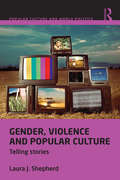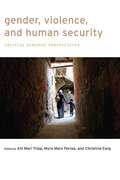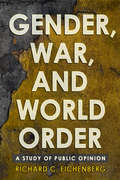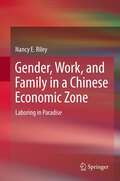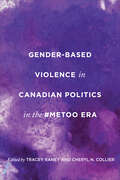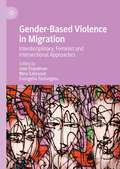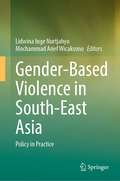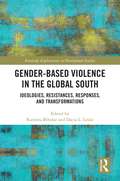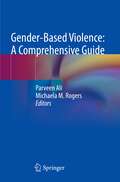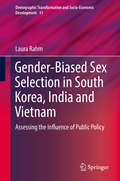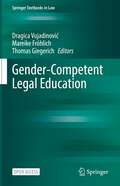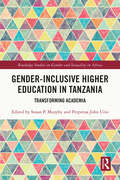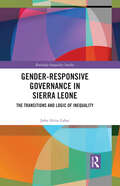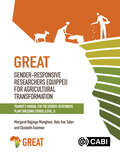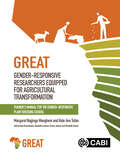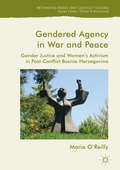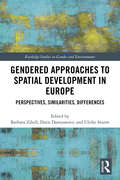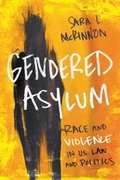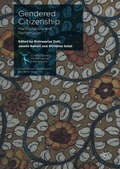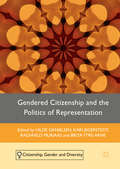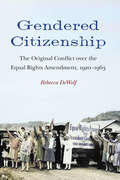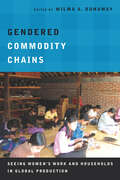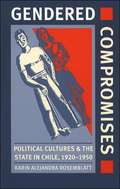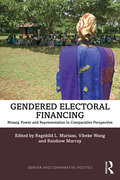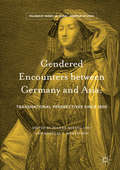- Table View
- List View
Gender, Violence and Popular Culture: Telling Stories (Popular Culture and World Politics)
by Laura J. ShepherdThis book examines the intersection of gender and violence in popular culture. Drawing on the latest thinking in critical international relations, media and cultural studies and gender studies, it focuses in particular on a number of popular TV shows including Angel, Buffy the Vampire Slayer, Firefly, Generation Kill, The Corner and The West Wing. The book makes a unique theoretical contribution to the ‘narrative turn’ in International Relations by illustrating the ways in which popular culture and global politics are intertwined and how we make sense of our worlds through these two frames. Methodologically, the book enhances discourse-theoretical analysis in IR through its incorporation of methods from narratology and film studies. The book proposes an aesthetic ethicopolitical approach to global politics which challenges us to interrogate how it becomes possible that we think what we think, it challenges the truths that we hold to be self-evident and that which we take to be common sense. It demands that we think carefully, critically, uncomfortably, about our world(s) – even when we’re ‘only’ watching television.
Gender, Violence, and Human Security: Critical Feminist Perspectives
by Myra Marx Ferree Aili Mari Tripp Christina EwigThe nature of human security is changing globally: interstate conflict and even intrastate conflict may be diminishing worldwide, yet threats to individuals and communities persist. Large-scale violence by formal and informal armed forces intersects with interpersonal and domestic forms of violence in mutually reinforcing ways. Gender, Violence, and Human Security takes a critical look at notions of human security and violence through a feminist lens, drawing on both theoretical perspectives and empirical examinations through case studies from a variety of contexts around the globe.This fascinating volume goes beyond existing feminist international relations engagements with security studies to identify not only limitations of the human security approach, but also possible synergies between feminist and human security approaches. Noted scholars Aili Mari Tripp, Myra Marx Ferree, and Christina Ewig, along with their distinguished group of contributors, analyze specific case studies from around the globe, ranging from post-conflict security in Croatia to the relationship between state policy and gender-based crime in the United States. Shifting the focus of the term “human security” from its defensive emphasis to a more proactive notion of peace, the book ultimately calls for addressing the structural issues that give rise to violence. A hard-hitting critique of the ways in which global inequalities are often overlooked by human security theorists, Gender, Violence, and Human Security presents a much-needed intervention into the study of power relations throughout the world.
Gender, War, and World Order: A Study of Public Opinion (Cornell Studies in Security Affairs)
by Richard C. EichenbergMotivated by the lack of scholarly understanding of the substantial gender difference in attitudes toward the use of military force, Richard C. Eichenberg has mined a massive data set of public opinion surveys to draw new and important conclusions. By analyzing hundreds of such surveys across more than sixty countries, Gender, War, and World Order offers researchers raw data, multiple hypotheses, and three major findings.Eichenberg poses three questions of the data: Are there significant differences in the opinions of men and women on issues of national security? What differences can be discerned across issues, culture, and time? And what are the theoretical and political implications of these attitudinal differences? Within this framework, Gender, War, and World Order compares gender difference on military power, balance of power, alliances, international institutions, the acceptability of war, defense spending, defense/welfare compromises, and torture. Eichenberg concludes that the centrality of military force, violence, and war is the single most important variable affecting gender difference; that the magnitude of gender difference on security issues correlates with the economic development and level of gender equality in a society; and that the country with the most consistent gender polarization across the widest range of issues is the United States.
Gender, Work, and Family in a Chinese Economic Zone
by Nancy E RileyThis book examines the dynamics of power within the families of married women who have migrated from rural areas to China's Dalian Economic Zone. Engaging the question of whether waged work gives women power in their families, this ethnographic study finds that women do indeed use their new positions and urban status to negotiate their family status. However, women use these new resources not necessarily to promote their own individual liberation, but rather to strengthen their contribution as wives and, especially, as mothers. Thus, this new modernity provides a space for the re-inscribing of traditional roles, even as it may work to give women new-found power within their families. How and why this process occurs is related to the dual inequalities these women face as rural migrants and as women.
Gender-Based Violence in Canadian Politics in the #MeToo Era
by Cheryl N. Collier Tracey RaneyGender-based violence in politics is a significant and growing problem that threatens the democratic process in Canada. Despite its prevalence, little academic research has been conducted on this topic to date. Gender-Based Violence in Canadian Politics in the #MeToo Era raises awareness of and presents new innovative research on this timely and pressing public issue. Here, leading experts from across Canada uncover critical new insights and identify potential solutions that would help address gender-based violence in politics, improve gender equality, and strengthen Canadian democracy. Using an intersectional lens, chapters range in their approaches; offer new concepts and measures of gender-based violence in online political spaces, political media coverage and cartoons, campaigns, municipal politics, and legislatures; and explore Indigenous ways of knowing about gender-based violence in Canadian politics. Additionally, the volume presents recommendations for decision-makers, policymakers, anti-violence advocates, and the academic community on how to best address the problem of gender-based violence in the political sphere.
Gender-Based Violence in Migration: Interdisciplinary, Feminist and Intersectional Approaches
by Jane Freedman Nina Sahraoui Evangelia TastsoglouWith contributions from a diverse array of international scholars, this edited volume offers a renewed understanding of gender-based violence (GBV) by examining its social and political dimensions in migration contexts. This book engages micro, meso, and macro levels of analysis by foregrounding a conceptualization of GBV that addresses both its interpersonal and structural causes. Chapters explore how GBV frameworks and migration management intersect, bringing to the forefront the specific inequalities these intersections produce for migrant women. Drawing upon several disciplines, the authors engage in co-writing a critical engagement which proposes an original understanding of how the concepts of intersectionality, vulnerability and precarity speak to each other from a feminist perspective. This volume will be of interest to scholars/researchers and policymakers in Gender Studies, Migration and Refugee Studies, Sociology, Political Science, Trauma Studies, Human Rights and Socio-Legal Studies.
Gender-Based Violence in South-East Asia: Policy in Practice
by Lidwina Inge Nurtjahyo Mochammad Arief WicaksonoThis book presents new research on gender-based violence in Southeast Asia, bringing together varied scholarly work in law, policy, and practice. It enables a greater understanding of violence against women as an international concern, highlighting particular issues that arise in the region. Against a background of international obligations to ensure women's rights through laws and policies that are geared at ending violence against women and girls, this research documents the state failures, individual shame and fear, and societal culture that collectively affects the reporting, investigation, prosecution of perpetrators, and protection of victims. The research explores differing legal mechanisms both internationally, and within nation states, relating to cases of physical and sexual violence. It recognizes the need for functioning mechanisms to ensure women can report their cases safely and be provided with protective and therapeutic services in a way that is systematic, effective, and measurable. Laws and court decisions are analyzed, crisis and safety centers are examined, and in-depth interviews are conducted with actors and NGOs with relevant roles and functions in the mechanism of cases of violence against women. The result is a comprehensive assessment of the incalculable harm it does within Southeast Asian society, and the obstacles it presents for law enforcement. The chapters uncover mechanisms with unique characteristics across Southeast Asia, providing a nuanced understanding of the cultural and social backgrounds, as well as the religious structures, that can both help and hinder suitable frameworks. It is relevant to scholars, policymakers, and practitioners in law, criminology, and gender sociology.“This is a valuable contribution towards empowering the women of South East Asia out of victimhood to valued equality, involvement in governance and leadership through the elimination of violence and discrimination and an excellent resource not just for those working in this field but for those involved in law making, the media and the people of South East Asia.”- Professor Felicity Gerry QC, Barrister at Crockett Chambers Melbourne and Libertas Chambers, London, and Professor of Legal Practice at Deakin University and Honorary Professor at Salford University.
Gender-Based Violence in the Global South: Ideologies, Resistances, Responses, and Transformations (Routledge Explorations in Development Studies)
by Dacia L. LeslieThis book amplifies the different voices and experiences of those facing gender-based violence (GBV) in the Global South. It explores the localised ways in which marginalised individuals design modes of coping with and address GBV, including cultural interpretations, and artistic and faith-based expressions.The book examines GBV triggers, prevalence, and societal impacts while referring to community, national, and regional mobilisation to deal with the phenomenon in its various manifestations, including physical, psychological, political, domestic, and public violence. It explores issues related to women’s negotiations with the patriarchal underpinnings of GBV; the role of the law and history in the perpetuation of GBV; the complementary role of culture and faith to legal protection against GBV, and access to justice for women and girls. In doing so, the book exposes understandings and expressions of GBV, as well as methodologies and indigenous initiatives to prevent it through local viable solutions. The book thus challenges the normalisation of GBV in the Global South.Providing concrete and culturally relevant suggestions for challenging ingrained models of gender understandings of violence in the Global South, this book will be of interest to academics in the fields of Development Studies, Gender Studies, Women’s Studies, Violence and Abuse Studies, Human Rights, Criminal Law, and Socio-Legal Studies.
Gender-Based Violence: A Comprehensive Guide
by Parveen Ali Michaela M. RogersThis book provides comprehensive information about various types of gender-based violence (GBV) and abuse. GBV is a major public health and social problem that affects people, mostly women and girls, in every community, culture, and country. GBV refers to the violence or a pattern of abusive behaviours including physical aggression, sexual coercion, psychological abuse and controlling behaviours resulting in physical, sexual or psychological harm. It is associated with severe physical and psychological consequences, and can result in death. . GBV can take many forms including female foeticide, infanticide, female genital mutilation, child marriage, grooming, trafficking, forced marriage, dowry- related abuse, honour-based violence, rape, sexual assault, stalking, harassment, street violence, abuse against older people, domestic violence, and intimate partner violence. It can take place in public, private and virtual settings, and within the context of intimate, familial, community and institutional relationships. While all these forms affect girls and women more, boys and men can also be exposed of various forms of violence including child abuse, sexual abuse, wartime violence, corporal punishment to name a few. This book takes a unique approach and presents an overview of gender-based violence and related practices throughout the world. The book is written in a user friendly manner in order to be accessible as an introductory text to a wide range of readers including students, practitioners and researchers. Edited by a public health academic and a social worker, with contributions representing a wide range of disciplines, the book will appeal to many professions including nurses, midwives, social care and social work practitioners, police, teachers, psychologists, and sociologists.
Gender-Biased Sex Selection in South Korea, India and Vietnam: Assessing the Influence of Public Policy (Demographic Transformation and Socio-Economic Development #11)
by Laura RahmThis book provides an in-depth analysis of the influence of public policy on sex selection. Three Asian countries were chosen for the comparative policy analysis, namely South Korea, India and Vietnam that share in common a historical legacy of son preference, high levels of sex imbalances and active policy response to curbing the growing demographic masculinization of their nations. The research based on the data collected from field work in the three countries shows that despite the adoption of very similar anti-sex selection policies the outcomes have been markedly different for each of the three countries. These unexpected diverse outcomes are explained partly by their different historical and cultural contexts, and partly to the different social, political and economic institutions and dynamics. This monograph offers careful and detailed explanations of both within and across country diversities in policy outcomes, pointing to the importance and the limits of cross-national policy learning and adoption, and raising questions about the efficacy of international organizations’ current approaches to global policy and knowledge transfer.
Gender-Competent Legal Education (Springer Textbooks in Law)
by Thomas Giegerich Dragica Vujadinović Mareike FröhlichMale-dominated law and legal knowledge essentially characterized the whole of pre-modern history in that the patriarchy represented the axis of social relations in both the private and public spheres. Indeed, modern and even contemporary law still have embedded elements of patriarchal heritage, even in the secular modern legal systems of Western developed countries, either within the content of legislation or in terms of its implementation and interpretation. This is true to a greater or lesser extent across legal systems, although the secular modern legal systems of the Western developed countries have made great advances in terms of gender equality. The traditional understanding of law has always been self-evidently dominated by men, but modern law and its understanding have also been more or less “malestreamed.” Therefore, it has become necessary to overcome the given “maskulinity” of legal thought. In contemporary legal and political orders, gender mainstreaming of law has been of the utmost importance for overcoming deeply and persistently embedded power relations and gender-based, unequal social relations. At the same time and equally importantly, the gender mainstreaming of legal education – to which this book aims to contribute – can help to gradually eliminate this male dominance and accompanying power relations from legal education and higher education as a whole. This open access textbook provides an overview of gender issues in all areas of law, including sociological, historical and methodological issues. Written for students and teachers around the globe, it is intended to provide both a general overview and in-depth knowledge in the individual areas of law. Relevant court decisions and case studies are supplied throughout the book.
Gender-Inclusive Higher Education in Tanzania: Transforming Academia (Routledge Studies on Gender and Sexuality in Africa)
by Susan P. Murphy Perpetua John UrioWhilst there is an extensive body of research exploring the barriers to gender equality and female empowerment in high-income states, there are far fewer systematic analyses within lower-income settings. This book draws on extensive empirical data to analyse gender mainstreaming and gender transformative actions in Tanzanian higher education.The book maps the practical landscape of gender mainstreaming across 14 universities in Tanzania, and the theoretical landscape of African theories of masculinities and femininities underpinning educational institutions and practices. It then assesses the Gender Awareness and Transformation through Education project, which was designed to support the development of gender expertise and capacities in research and education at one specific institution, across both its administrative and academic units. Current and future academics at Dar es Salaam University College of Education were trained in gender-based research and education, and a strategic plan was developed to guide in the establishment of a Gender Research Centre that will provide gender expertise in research and teaching to the College; and, over time, to other HEIs nationally and regionally. By bringing together real-world insights from action-based research, the book demonstrates the impact of real-time social change and gender transformation, with implications both for Tanzania and beyond.Bringing novel empirical insights and policy recommendations, this book will be of interest to researchers and policy makers across the fields of gender studies, education, and African studies.
Gender-Responsive Governance in Sierra Leone: The Transitions and Logic of Inequality (Routledge Inequality Studies)
by John Idriss LahaiThis book investigates gender equality and women’s empowerment in Sierra Leone, focusing in particular on women’s interactions with the state and its development partners. In particular, it highlights women’s increasing agency in acquiring knowledge, diffusing power, engaging in grassroots politics, and compelling the government to adopt more gender-responsive policies. Drawing on extensive fieldwork and original multidisciplinary research methods (including econometric and statistical models), the book first sets out the history and impact of inequality in Sierra Leone. It then goes on to shed light on the constructive and collaborative engagement of women and the state on a variety of local and external strategies for promoting gender equality. Drawing throughout on insights from across gender studies, sociology, anthropology, economics, and political science, the book highlights how women are succeeding in transforming marginality into agency in order to build a platform for influencing change. By qualifying and quantifying the challenges of gender inequality in Sierra Leone, and the progress that is being made, this book provides important insights that will be relevant to other fragile, post-conflict states within Africa. The book will be of interest to students and researchers studying women and gender studies, African studies, economics, international development, sociology, and political science and international relations. The book will also deepen policymakers’ and practitioners’ understanding of women’s diverse trajectories and experiences, and how the typology of government affects the patterns of inequality and equality.
Gender-responsive Researchers Equipped for Agricultural Transformation, Level 2.: Trainer’s Manual for the Gender-Responsive Plant Breeding Course
by Dr Margaret Najjingo Mangheni Professor Hale Ann Tufan Dr Elizabeth AsiimweThis manual presents the training process for the Gender-Responsive Plant Breeding course, implemented by Makerere and Cornell Universities, over a period of five years (2016-2020), under the Gender-Responsive Researchers Equipped for Agricultural Transformation (GREAT) project funded by the Bill and Melinda Gates Foundation. It has five broad parts: I) Introduction; II) Required preparation before the course; III) Phase one (9-day, face-to-face training); IV) the 5-month Field Training phase; and V) Phase two (5-day, face-to-face training). Each session consists of specific learning objectives, session plans and slides, delivery methods, practical exercises and examples, as well as relevant tips and synthesized take-home messages. The sessions were developed by an international multidisciplinary team of experts in gender and agriculture and subjected to a rigorous peer review and quality assurance process. GREAT aims to contribute to building a pool of gender-responsive agricultural researchers able to advance more equitable and effective agricultural systems in Africa and beyond. This manual is for all facilitators/trainers interested in applied, gender responsive agricultural research.
Gender-responsive Researchers Equipped for Agricultural Transformation: Trainer’s Manual for the Gender-Responsive Plant Breeding Course
by Dr Margaret Najjingo Mangheni Professor Hale Ann TufanThis manual presents the training process for the Gender-Responsive Plant Breeding course, implemented by Makerere and Cornell Universities, over a period of five years (2016-2020), under the Gender-Responsive Researchers Equipped for Agricultural Transformation (GREAT) project funded by the Bill and Melinda Gates Foundation. It has five broad parts: I) Introduction; II) Required preparation before the course; III) Phase one (9-day, face-to-face training); IV) the 5-month Field Training phase; and V) Phase two (5-day, face-to-face training). Each session consists of specific learning objectives, session plans and slides, delivery methods, practical exercises and examples, as well as relevant tips and synthesized take-home messages. The sessions were developed by an international multidisciplinary team of experts in gender and agriculture and subjected to a rigorous peer review and quality assurance process. GREAT aims to contribute to building a pool of gender-responsive agricultural researchers able to advance more equitable and effective agricultural systems in Africa and beyond. This manual is for all facilitators/trainers interested in applied, gender responsive agricultural research.
Gendered Agency in War and Peace
by Maria O’ReillyThis book examines how gendered agency emerges in peacebuilding contexts. It develops a feminist critique of the international peacebuilding interventions, through a study of transitional justice policies and practices implemented in Bosnia & Herzegovina, and local activists’ responses to official discourses surrounding them. Extending Nancy Fraser’s tripartite model of justice to peacebuilding contexts, the book also advances notions of recognition, redistribution and representation as crucial components of gender-just peace. It argues that recognising women as victims and survivors of conflict, achieving a gender-equitable distribution of material and symbolic resources, and enabling women to participate as agents of transitional justice processes, are all essential for transforming the structural inequalities that enable gender violence and discrimination to materialise before, during, and after conflict. This study establishes a new avenue of analysis for understanding responses and resistances to international peacebuilding, by offering a sustained engagement with feminist social and political theory.
Gendered Approaches to Spatial Development in Europe: Perspectives, Similarities, Differences (Routledge Studies in Gender and Environments)
by Barbara Zibell Doris Damyanovic Ulrike SturmThis book explores the extent to which gendered approaches are evident and effective in spatial development in selected European countries. Beginning with an introduction to theories and concepts of gender, space and development, the book includes a brief historical review of gender in spatial planning and development throughout Europe in general, and an overview of different national frameworks in European countries, comparing legal, organisational and cultural similarities and differences. This is followed by a critical reflection on how simplifications and stereotypes of gender concepts are used in the practice of spatial development. The main part of the book offers a transnational discussion of planning practices on selected thematic topics. It starts with gender-sensitivity in urban master planning and at neighbourhood level referring to different types of planning manuals. Furthermore, the book focuses on gender-sensitive evaluation in urban planning as well as international agendas for sustainable development as a framework for a new generation of gender equality policies. The chapter authors assert that climate change, migration and austerity have threatened gender equality and therefore spatial development needs to be especially alert to gender dimensions. The editors end with an outlook and suggestions for further action and research on gender issues in spatial development. With inputs from some of Europe’s leading thinkers on gender, space and development, this volume is designed to inspire students, scholars and practitioners to reflect upon the contribution that gendered approaches can make in the various fields of spatial development and environmental planning.
Gendered Asylum: Race and Violence in U.S. Law and Politics
by Sara L MckinnonWomen filing gender-based asylum claims long faced skepticism and outright rejection within the U.S. immigration system. Despite erratic progress, the United States still fails to recognize gender as an established category for experiencing persecution. Gender exists in a sort of limbo segregated from other aspects of identity and experience. Sara L. McKinnon exposes racialized rhetorics of violence in politics and charts the development of gender as a category in U.S. asylum law. Starting with the late 1980s, when gender-based requests first emerged in case law, McKinnon analyzes gender and sexuality-related cases against the backdrop of national and transnational politics. Her focus falls on cases as diverse as Guatemalan and Salvadoran women sexually abused during the Dirty Wars and transgender asylum seekers from around the world fleeing brutally violent situations. She reviews the claims, evidence, testimony, and message strategies that unfolded in these legal arguments and decisions, and illuminates how legal decisions turned gender into a political construct vulnerable to U.S. national and global interests. She also explores myriad related aspects of the process, including how subjects are racialized and the effects of that racialization, and the consequences of policies that position gender as a signifier for women via normative assumptions about sex and heterosexuality.
Gendered Citizenship
by Janelle Reinelt Bishnupriya Dutt Shrinkhla SahaiThis book explores how citizenship is differently gendered and performed across national and regional boundaries. Using 'citizenship' as its organizing concept, it is a collection of multidisciplinary approaches to legal, socio-cultural and performative aspects of gender construction and identity: violence against women, victimhood and agency, and everyday issues of socialization in a globalized world. It brings together scholars of politics, media, and performance who are committed to dialogue across both nation and discipline. This study is the culmination of a two-year project on the topic of 'Gendered Citizenship', arising from an international collaboration that has sought to develop a comparative and yet singular perspective on performance in relation to key political themes facing our countries of origin in the early decades of this century. The research is interdisciplinary and multinational, drawing on Indian, European, and North and South America n contexts.
Gendered Citizenship and the Politics of Representation
by Hilde Danielsen Kari Jegerstedt Ragnhild L. Muriaas Brita Ytre-ArneThis book sheds new light on gender-based inequalities in a globalized world. Interdisciplinary in scope, it reveals new avenues of research on gendered citizenship, analysing the possibilities and pitfalls of being represented and of representing someone. Drawing on contexts both historical and contemporary, it queries what it means to have access to representation, which power structures regulate and produce representation, and who counts as a citizen. Situating its arguments in the global struggle for hegemony, it answers such thought-provoking questions as whether one can represent someone or be represented without recourse to citizenship and, conversely, whether it is possible to be a citizen if one does not have access to representation. This engaging edited collection will appeal to students and scholars of sociology, social anthropology, history, media studies, political science, literature, gender studies and cultural studies. div>
Gendered Citizenship: The Original Conflict over the Equal Rights Amendment, 1920–1963
by Rebecca DeWolfBy engaging deeply with American legal and political history as well as the increasingly rich material on gender history, Gendered Citizenship illuminates the ideological contours of the original struggle over the Equal Rights Amendment (ERA) from 1920 to 1963. As the first comprehensive, full-length history of that struggle, this study grapples not only with the battle over women&’s constitutional status but also with the more than forty-year mission to articulate the boundaries of what it means to be an American citizen. Through an examination of an array of primary source materials, Gendered Citizenship contends that the original ERA conflict is best understood as the terrain that allowed Americans to reconceptualize citizenship to correspond with women&’s changing status after the passage of the Nineteenth Amendment. Finally, Rebecca DeWolf considers the struggle over the ERA in a new light: focusing not on the familiar theme of why the ERA failed to gain enactment, but on how the debates transcended traditional liberal versus conservative disputes in early to mid-twentieth-century America. The conflict, DeWolf reveals, ultimately became the defining narrative for the changing nature of American citizenship in the era.
Gendered Commodity Chains: Seeing Women's Work and Households in Global Production
by Wilma A. DunawayGendered Commodity Chains is the first book to consider the fundamental role of gender in global commodity chains. It challenges long-held assumptions of global economic systems by identifying the crucial role social reproduction plays in production and by declaring the household as an important site of production. In affirming the importance of women's work in global production, this cutting-edge volume fills an important gender gap in the field of global commodity and value chain analysis. With thirteen chapters by an international group of scholars from sociology, anthropology, economics, women's studies, and geography, this volume begins with an eye-opening feminist critique of existing commodity chain literature. Throughout its remaining five parts, Gendered Commodity Chains addresses ways women's work can be integrated into commodity chain research, the forms women's labor takes, threats to social reproduction, the impact of indigenous and peasant households on commodity chains, the rapidly expanding arenas of global carework and sex trafficking, and finally, opportunities for worker resistance. This broadly interdisciplinary volume provides conceptual and methodological guides for academics, graduate students, researchers, and activists interested in the gendered nature of commodity chains.
Gendered Compromises
by Karin Alejandra RosemblattWith this book, Karin Rosemblatt presents a gendered history of the politics and political compromise that emerged in Chile during the 1930s and 1940s, when reformist popular-front coalitions held power. While other scholars have focused on the economic realignments and novel political pacts that characterized Chilean politics during this era, Rosemblatt explores how gender helped shape Chile's evolving national identity. Rosemblatt examines how and why the aims of feminists, socialists, labor activists, social workers, physicians, and political leaders converged around a shared gender ideology. Tracing the complex negotiations surrounding the implementation of new labor, health, and welfare policies, she shows that professionals in health and welfare agencies sought to regulate gender and sexuality within the working class and to consolidate the male-led nuclear family as the basis of societal stability. Leftists collaborated in these efforts because they felt that strong family bonds would generate a sense of class belonging and help unify the Left, while feminists perceived male familial responsibility as beneficial for women. Diverse actors within civil society thus reworked the norms of masculinity and femininity developed by state agencies and political leaders--even as others challenged those ideals.
Gendered Electoral Financing: Money, Power and Representation in Comparative Perspective (Gender and Comparative Politics)
by Ragnhild L. Muriaas Vibeke Wang Rainbow MurrayIllustrated by in-depth empirical research from six country studies, Gendered Electoral Financing: Money, Power and Representation in Comparative Perspective is the first cross-regional examination of the nexus between money, gender and political recruitment across the world. Money is assumingly one of the greatest barriers to women in the political recruitment process. The financial disadvantage of women is expected to constitute an obstacle for women’s entry into politics everywhere and especially in developing countries where women’s socio-economic status is disproportionately low relative to men’s. This line of reasoning has caused a global upswing in both candidate- and party-directed financial schemes introduced to enhance gender balance in political office. This book develops a typology of different kinds of gendered electoral financing schemes and builds theories about its causes and consequences. By comparing how gendered electoral financing affects political recruitment processes in both established and emerging democracies, the authors identify whether and how the funding mechanisms incentivize a shift in political behavior. Gendered Electoral Financing is a timely, informative and well-written book that does an excellent job of explaining, in language accessible to students and researchers alike, the cost of elections, gender imbalance in political office and the effects of financial incentive mechanisms to increase women’s representation in politics.
Gendered Encounters between Germany and Asia
by Joanne Miyang Cho Douglas T. McgetchinThis volume provides new insights into gendered interactions over the past two centuries between Germany and Asia, including India, China, Japan, and previously overlooked Asian countries including Vietnam, the Philippines, Thailand, and Korea. This volume presents scholarship from academics working in the field of German-Asian Studies as it relates to gender across transnational encounters in the nineteenth and twentieth centuries. Gender has been a lens of analysis in isolated published chapters in previous edited volumes on German-Asian connections, but nowhere has there been a volume specifically dedicated to the analysis of gender in this field. Rejecting traditional notions of West and East as seeming polar opposites, their contributions to this volume attempts to reconstruct the ways in which German and Asian men and women have cooperated and negotiated the challenge of modernity in various fields.
